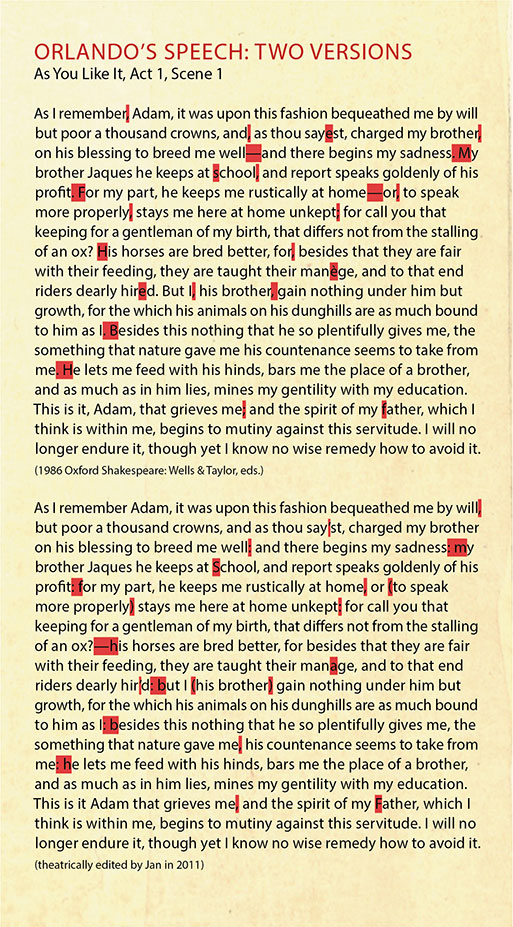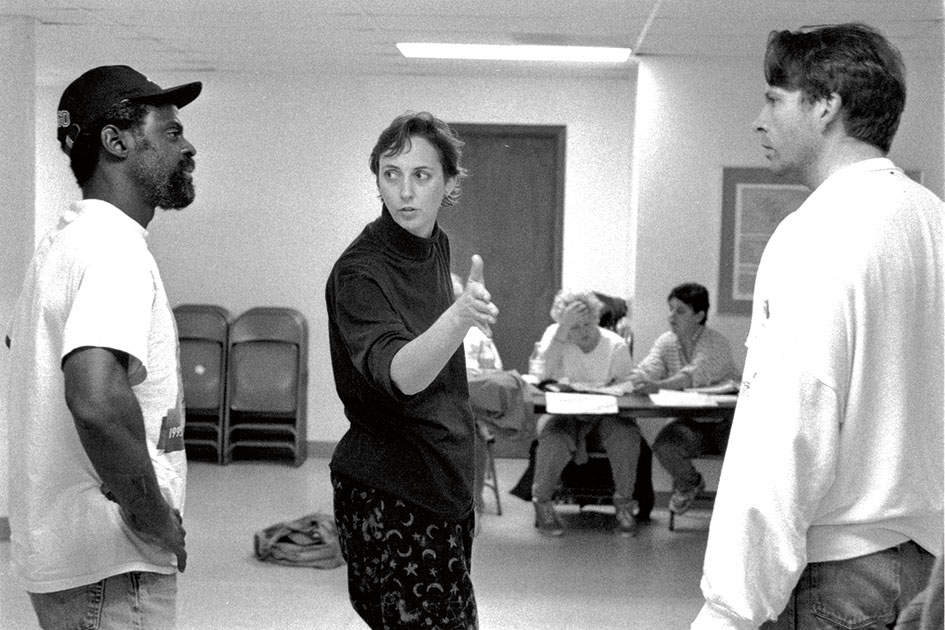The Battle of the Bard
Jan Powell MALS ’86 says literary editors have diluted Shakespeare’s fury.
The real Shakespeare debate is not who wrote the plays, says Jan Powell, but who reads them—and how they have been edited.
“Shakespeare didn’t just tell stories,” says Jan, who founded the Tygres Heart Shakespeare Company in Portland. “He used language to textualize what it is to be human, to fall in love, to die.” While Shakespeare’s language is dense, emotional, and epic in every way, it is not always easy to interpret—leading to the longstanding battle between readers and performers, in whose camp Jan now stands.
Shakespeare’s plays, initially written for performance, made their way onto the printed page on the sly, handed over by an actor or hand scribed during a performance in the interest of capitalizing on a play’s success. The first editions, in a quarto format, introduced typesetting or copy errors into the scripts, further compounding errors made by earlier scribes. Only with the publication in 1623 of Mr. William Shakespeare’s Comedies, Histories & Tragedies, known as the First Folio, did the performer and the reader have access to an authentic collection—but without the authoritative overview of William, who had died seven years earlier.
Subsequent editions were subject to modernization—spelling and punctuation current at the time—and emendation reflecting editorial interpretation. Jan is comfortable with the eccentricities in the language—often interpreted as errors by editors—and punctuation that brings the language to life, facilitating an immediate engagement between actor and audience during performance.
Shakespeare’s scripts have weathered the editing of the centuries, and continue to be subject to changes, interpretations, cuts, and additions, she says. But while editing is inevitable, modern editions tend to favor the reader and “scrub out the lifeblood” for actor and director. Jan laments that there is no published edition of Shakespeare’s work dedicated to the specific challenges involved in producing Shakespeare. “There is no starting place—and there are hundreds of text differences between one printed edition or another. Each published play is essentially a new text, created according to the editor’s individual taste, bias, knowledge, and intuition.”
The textual choices made by literary editors are analogous to the choices made by directors preparing for a production. Each identifies themes and motifs, interprets archaisms, clarifies complex character relationships, and reinterprets the behavior and manners of the Elizabethans. For all that, the literary editor’s staging remains “conceptual” rather than “material,” relying on hearing voices rather than hearing language voiced.
As a case in point, Jan cites the “gripping” punctuation in Orlando’s opening speech as it was rendered in the First Folio edition of As You Like It—the play she examined in detail in her doctoral dissertation, Mind’s Eye: Theatrical Editing of Shakespearean Text. Some editors have chosen to break up the speech by replacing the “Folio colons” with punctuation suited to reading, such as commas and periods. But Jan suggests that the colons strengthen the connection of one phrase to another and build intensity; substituting commas changes the intent and dilutes the energy and emotion on which a performer must draw. “The theatrical editor should assume that everything about the way text is laid out on the page will matter to practitioners, who will pay attention to capitalization, blank spaces, pauses, rhythm, meter, punctuation, and the overall shape of the text, and will find interpretive meaning in them.”
Jan abhorred Shakespeare’s plays until she attended a performance at the Oregon Shakespeare Festival in Ashland and experienced the energy of the spoken word. In the Reed MALS program, she focused on theatre and textual analysis. “Reed opened the world of the mind,” she says, and helped her undertake the challenge of directing: diving into script and text, and learning the intent of the playwright. Shortly thereafter, she cofounded Tygres Heart, whose name—drawn from a line in Henry VI—symbolized her commitment to her art. Combining a “ferocious, muscular, and aggressive” style and an intimacy of space, production, and language, she has continued to engage audiences, actors, and students for decades.
Her work in Shakespeare falls under the category of American performance, “a wonderful merging of English language and American physical spontaneity,” that she was introduced to decades ago by a Wisconsin theatre company and through her study with John Barton at the Royal Academy of Dramatic Art in London. Barton gave her permission, she says, to unleash her innovative, risk-taking approach to Shakespeare, which is not unlike the “full-body commitment” the Bard employed.
Brimming with energy, Jan intends to publish theatrical editions that actors and directors can go to when they begin work on a production. She envisions editing that will support staging, inspire creativity for the director and actor, and ultimately delight the audience.
See more at www.janpowell.us.

Tags: Performing Arts, Alumni
